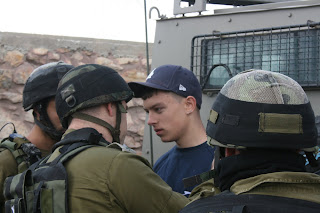




Español.-
Yaser y su familia beduina (incluyendo 8 niñosa) viven durante las temporadas de primavera en Khirbet Samra, Valle del Jordán, desde 2006.
Ayer, 30 de marzo 2011, a las 8 de la noche, el ejército de Israel se presentó en su hogar diciendo que buscaban terroristas de Nablus, que supuestamente Yaser había escondido. A pesar de que Yaser insistió de que solamente estaba su familia allí, los soldados obligaron a todos a salir de sus tiendas y a presentar sus identificaciones, incluso a los niños que estaban durmiendo ya en ese momento y desperataron aterrorizados.
Ante la solicitud del ejército, los miembros de la familia presentaron sus credenciales. Luego de verificar que ninguno de los presentes era de Nablus, los soldados se negaron a explicar por qué creían ellos que había gente de Nablus allí, y dijeron que debían revisar las habitaciones porque sospechaban que había armas escondidas. El primer lugar que registaron fue la habitación donde los niños habían estado durmiendo desparramando ropas y cobijas por el suelo. Como no encontraron armas se dirigieron al lugar donde la familia almacena la leche y la volcaron. 60 litros de leche que la familia tenía lista y preparada para elaborar queso. De paso volcaron también el azúcar en el piso de tierra.
Yaser y su familia tienen rebaños de cabras. De ellas obtienen leche y elaboran productos para la alimentación familiar y para vender en Hebrón.
La producción y elaboración de leche constituye su único ingreso. Ayer, todas las cabras habían sido ordeñadas, tarea que no siempre se realiza pero que justamente ayer fue hecha pensando en ocuparse hoy de la elaboración de quesos. Este stock fue destruido y producto del maltrato, una de las cubetas de batido de la leche, se dañó y ahora no funciona.
El ejército permaneció en el sitio durante una hora y media mientras la familia veía cómo le daban vuelta la casa y destruían su trabajo.
English.-
Yaser and his family (including 8 children) have been living during the spring time in Kherbet Samra, Jordan Valley, since 2006. At 8.30 pm yesterday evening the Israeli army came to his home claiming to be looking for terrorists from Nablus who they said they knew were staying with him. Despite his insistence that only his family were there they made everyone leave the tents and requested to see the ID papers of all of the family, including his terrifed young children.
On the request of the army the family produced their ID. All the ID's showed that they were related and none of the IDs produced were Nablus IDs. The army refused to say why they believed that people from Nablus were staying with the family. For some time the family were made to stand while the army decided what to do.
The army then claimed that they believed that the family were hiding guns in their tents. They made their way straight to where the children slept and ransacked their tent emptying all the clothes onto the floor. After failing to find any guns they went to the milk store and poured the contents of the milk vessels onto the floor and mixed it with sugar.
Yaser and his family keep goats. They use their milk to drink, to make cheese for them to eat and then sell what is left in Hebron. The milk from the families goats is their only form of income. That morning all of the goats had been milked and their full store (60 litres) was destroyed. At no point did the army show any documents which proved the search was legal as well as speaking in Hebrew the whole time so that the family were unable to understand what was happening. After destroying the families livelihood they left.
In total the army remained at the famlies home for one and a half hours whilst the family were made to watch as their home was turned upside down and their way of generating income to support them destroyed.
This is just one case of harrassment of local Palestinian farmers in the Jordan Valley by the Israeli army out of many. The constant harrasment is part of a deliberate policy to make life so difficult for Palestinian families that they leave the valley whilet at the same time the Israeli state continues to build new settlement homes for Israeli citizens to expand their agricultural development. This colonisation of the valley by Israel is destroying the lives of Palestinians that have lived here for generations











































